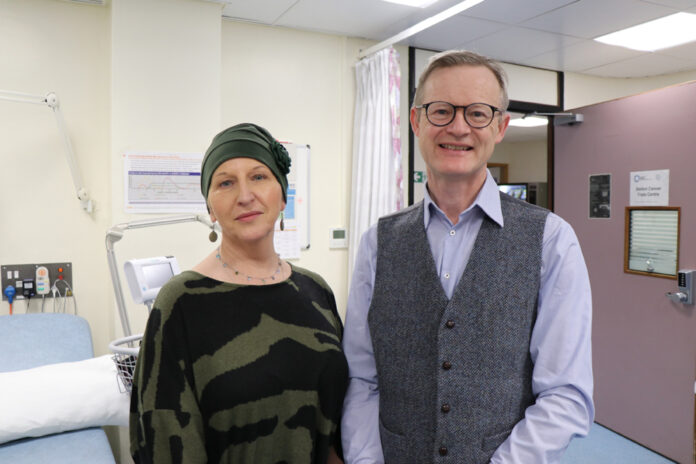A patient from Dundee has become the first patient in Europe on a global trial to be given a personalized cancer therapy (Individualised Neoantigen Therapy – INT) for their type of cancer, using similar technology to the Covid-19 mRNA vaccine. Jennifer Robertson, 59, from Broughty Ferry, who is undergoing treatment for gastro-oesophageal cancer, received an investigational therapy called mRNA-4157 (V940), which was developed by pharmaceutical companies Moderna and MSD.
This mRNA therapy has only been given to four other people with this cancer type globally so far, through the Phase 1 clinical trial (NCT03313778). Its components are designed against each patient’s tumour by analysing its biological make-up to discover which potential targets for the immune system are present on the tumour.
An individualised mRNA therapy is then specifically created to enable the patient’s own immune system to attack and destroy those tumour cells and administered to the patient as an injection. Tayside Cancer Centre, a University of Dundee and NHS Tayside facility, is one of 38 cancer centres around the world running this trial of the mRNA therapy, which is also being investigated in people with non-small cell lung cancer and pancreatic cancer as well as gastric and gastro-oesophageal cancer.
Medical researchers at the University will administer Jennifer with up to nine doses of the mRNA therapy, alongside traditional treatments of surgery and chemotherapy. She said, “I’m excited and privileged to be the first person in Europe to have this treatment, that’s really something special.”
Jennifer was diagnosed with gastro-oesophageal cancer in July after suffering acid reflux and food traveling back up her oesophagus after having been eaten. “I’d had two endoscopies and a CT scan done so I’d heard the word cancer many times before I was given my diagnosis, but it was still a shock,” she said.
“There is only one outcome for me and that is that I’m going to overcome it and beat it – it’s a very positive fight and I’m going to get through it. Anything I can do along the way to help cancer research, I’m happy to do.” Only 20 patients across the world who have gastro or gastro-oesophageal cancer are planned to be given this therapy during its current phase 1 clinical trial.
Russell Petty, Professor of Medical Oncology at the University and Director of Research and Development at NHS Tayside, is leading the clinical trial in Scotland. The trial is also open across the UK in hospitals in London, Manchester and Oxford. Professor Petty said, “This therapy aims to provide a new approach to engaging the patient’s own immune system to fight their cancer. This trial is establishing critical foundations that bring us closer to developing therapies for solid tumours that are potentially efficacious, less toxic and more precise.
“It is currently being used alongside other cancer treatments in patients who are receiving surgery to remove their tumours, but ultimately if successful the therapy could have much broader use in the future. “This is a very novel treatment approach which could transform the way we treat cancer, and these trials are the beginning of that journey. Every patient who this works for provides us with more knowledge to improve the way we treat cancer.”
How individualised neoantigen therapies work. An individualised neoantigen therapy is a treatment which signals to the immune system to attack the tumour with the hopes of eliminating tumour cells or preventing the tumour from returning after surgery.
It does this by encouraging the immune system to attack specific proteins on the surface of the tumour – known as neoantigens. However, there are thousands of different neoantigens which could be present in cancer tumours. Every patient’s tumour is individual and could hold any combination of neoantigens.
Some cancer cell antigens are stronger targets than others, as their reaction within the immune system is increased. To receive a personalised cancer therapy, a patient must first have a biopsy sample taken from their tumour which is then analysed to identify which antigens are present.
The therapy is then designed to target the antigens found to be present, and when it is administered into the patient’s body, it aims to boost the immune system to fight off these specific targets. Professor Petty said, “An INT creates an anti-tumour immune response within the body and amplifies it. “Previous trials which have looked at mRNA-4157 in other types of cancer suggest that this approach may be effective.
“Now we need to increase participation numbers in these trials and follow patients over a number of years to find out more about their long-term benefits.”





















